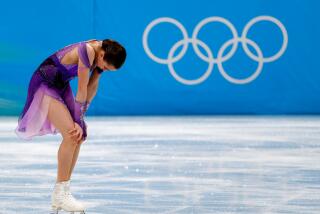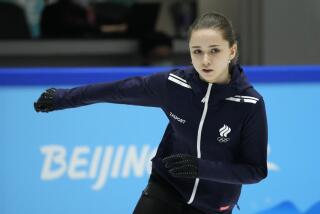Godina’s Golden Second
- Share via
ATHENS — John Godina reclaimed what he had lost here--the men’s world shotput championship--when 1997 gold medalist Aleksandr Bagach of Ukraine had his title stripped Thursday after failing a doping test.
Godina, the 1995 world titlist, was unseated by Bagach on Saturday night at the IAAF World Championships, out-throwing Godina, 70 feet 5 1/2 inches to 70-4 1/4. But Thursday, Bagach was disqualified after testing positive for the stimulant ephedrine, moving Godina from second place to first and American teammate C.J. Hunter from fourth place to a bronze medal.
Oliver-Sven Buder of Germany, third after Saturday’s finals, was awarded the silver medal.
“It’s nice to see that the [drug testing] system works,” said Godina, the former NCAA shotput and discus champion at UCLA. “[But] whether he was cheating or not, I should have beaten him. With him gone, I would have won by about eight inches.”
Hunter, heretofore best known for his impending nuptials to women’s 100-meter world champion Marion Jones, reacted similarly to being reassigned the bronze medal, his first medal at a major international meet.
“That’s fine. If they’re not clean, I’m glad he got caught,” said Hunter, whose best mark Saturday was 66-8 1/2.
“This was the worst meet I’ve had in a while. It’s about the performance and not the medal. The medal is nice, but I would rather have thrown farther and not medaled.”
Bagach was livid over the news of his disqualification, claiming the ephedrine traces found were the result of his taking an over-the-counter medicine. Ephedrine is commonly found in cough and ginseng-based medicines, but can also be used as a masking agent.
“It is so absurd,” Bagach told the Associated Press. “It is nonsense. I cannot believe it. I have been taking natural medication and I was guaranteed that everything would be OK. Now the commission finds ‘pseudo-ephedrine.’ ”
Bagach has now experienced both sides of drug-related disqualification at the World Championships. In 1993, Bagach replaced American Mike Stulce as bronze medalist when Stulce tested positive for drugs.
Previously, Bagach was banned for two years for showing an excessive testosterone level after finishing third in the 1989 European Cup, a violation that cost the Soviet Union its place in the World Cup.
Under the IAAF’s recently revised drug policy, Bagach will receive a public warning for this offense instead of an automatic three-month suspension.
A second offense, under the new rules, will draw a two-year suspension, instead of the previously standard four-year ban.
Two other athletes, 400-meter hurdler Pascal Maran of France and triple jumper Oxana Zelinskaya of Kazakstan, tested positive for ephedrine and were disqualified. Neither came close to medaling, both failing to advance beyond the preliminary rounds.
“You hate to have stuff like this happen,” said Dean Hayes, U.S. men’s team coach. “If we’re really doing our job in policing drugs, this wouldn’t happen. We try to curb it . . . and when you succeed in enforcing the policy, at the same time, you get a black eye.”
More to Read
Go beyond the scoreboard
Get the latest on L.A.'s teams in the daily Sports Report newsletter.
You may occasionally receive promotional content from the Los Angeles Times.






